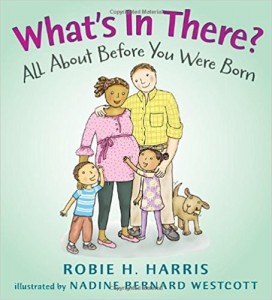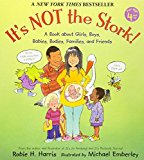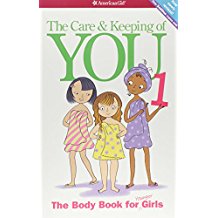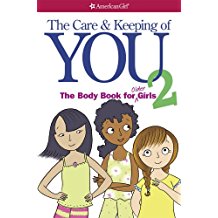By Smarty Guest Blogger Laura N Sinai, MD, Signature Pediatrics
The ‘50s model of sitting your teenaged son or daughter down at the kitchen table for the one and only big sex talk is behind us. And that’s a good thing, because sex is a topic that will and should come up for you and your children from toddlerhood until the day they move out. Of course, your approach will change as your children grow, but don’t fool yourself into thinking it’s a topic that can or should be delayed.
Preschool
Sex education really begins with knowing what part is what. Bath time with a toddler is a great opportunity to teach the accurate names for all body parts. Along with a name, throw in a little information about what each body part does such as noses are for sniffing. The bath is also a great time to discuss the importance of privacy – another key element of sex education. This is easiest to explain by teaching that private parts are the parts covered by a bathing suit. Privacy means two things. First, that these areas are kept covered except when you are in private. And second, no one is allowed to touch a person’s private areas except: 1) parents when helping with a problem/bathing 2) doctors when parents are present and 3) the child himself.
Little children have plenty of simple questions about sex. Keep in mind that at this age they don’t even know they’re asking about sex. Preschoolers may ask how babies get into and out of a mommy’s “tummy”. They are usually curious about why boys have a penis and girls have a vagina. At this age, the answers should be factual and short. A brief “the baby comes out of the vagina or a doctor takes the baby out” is usually sufficient. Similarly, a brief explanation of procreation is all that is needed: “Mommies have eggs (just like chickens, only smaller!) and Daddies have sperm that when mixed together grow into a baby”. Most preschoolers will move on to the next subject quickly. If you can’t come up with a simple answer to a surprise question, start by asking them what they think the answer is while formulating your own.
One of the most important aspects of these early conversations is teaching your child that his/her questions will be respected and answered truthfully. Setting this expectation will hopefully lead to his/her ability to ask you the hard questions as they get older. A helpful preschool appropriate book is “What’s in There?: All About Before You Were Born”.
Elementary School
Now that you’ve opened the door to talking about sex with your preschooler get ready for the topic to become more in depth in elementary school. Your school aged child is likely to come home with unexpected questions or newly acquired “facts” about sex. Continue to use a simple, straightforward approach to correct any inaccuracies you hear and ask if they have any more questions. They will let you know when they’ve gotten enough information. From 6 to 11 years old children are not especially interested in details about sex, but rather they are looking for information about biology. There are plenty of great age appropriate books to read with your child if you are feeling tongue tied as the details get more specific. Some great titles include, “It’s Not the Stork” and “It’s So Amazing”.
Elementary school age conversations on sex should also delve into relationships. Talking about different types of love such as that between a child and parent versus that between two parents sets the stage for discussing when people should and shouldn’t have babies. Before your son or daughter is 10 you’ll want to have several conversations about puberty and menstruation. You are probably going to have to bring these topics up rather than wait for questions as children are often self-conscious about it, or don’t even know how to ask. Great books to read with your 8 to 11-year-old include “The Boy’s Body Book”,
and “The Care and Keeping of You” Series from American Girl: (Smarties, pay attention here, we will have a fun Smarty giveaway on these books in the coming weeks, so stay tuned! ~Jen P)
Middle School
Conversations about sex can get difficult for parents as their children move into middle school, ages 11-14. But the older kids get, the more they need to have factual conversations about sex with their parents. At this age, they are being bombarded with all kinds of sexual messages from advertising, movies, and every element of pop culture and social media. You can be the sensible, accurate scaffolding that helps them build their healthy sexual identity and belief system. This will only happen if you talk about sex regularly. Use events in the media, from school, or from TV and movies as springboards for conversations. Be sure to avoid making your conversations all about “don’t”. Make sure you listen at least as much as you talk. Avoid lectures and try to ask a myriad of questions such as “what does it mean to have a boyfriend?”, “how does a person know when they are ready for a relationship?”, or “how do you know if a relationship is healthy?”. Keep your conversations general. Just as you don’t want to share your own sexual history, you want to avoid quizzing your children about theirs. The information you share should be objective and factual. It is also extremely important at this age to start discussing healthy versus unhealthy relationships. You want to make sure your kids know that they should feel good about themselves and respected in a relationship; never fearful, of low value, replaceable or other negative emotions that signify a problem. Remind your children that you will always support them even if they make a relationship decision you disagree with. Knowing this will help them come to you in a crisis instead of trying to solve a problem on their own.
High School
In high school, you will build upon the conversations you started with your middle schooler. It’s time to switch from short answers about sex to long and more detailed ones. Remember to keep the conversation generic and minimize personal disclosure and personal questions. Let your teen feel safe that they are not going to get “the third degree”. Stop yourself from giving a speech. At this stage, it is important to have honest, accurate discussions about STIs (sexually transmitted infections), pregnancy, and birth control. Remember, discussions shouldn’t turn into a list of “don’t”. Do your best to listen as much as you talk. Ask questions such as “what would make a person ready to have sex?”, “why should you wait to have sex?”, “what are possible positive and negative results from having sex?”.
This is also an age to reinforce the things that make a healthy relationship such as respect, honor, love, trust, honesty, and kindness. Be clear that a relationship of criticism, mistrust, isolation, insult, insecurity, fear, coercion, loss of self-worth and other demeaning feelings is unhealthy and possibly unsafe. Emphasize that safety is non-negotiable. Create a code word with your teen so that they can count on you to get them out of any bad situation without saying (texting?) almost anything except “chocolate chips”, at which point you will come pick them up wherever and whenever no questions asked! Reinforce the fact that you unconditionally love them and you will help them in a crisis no matter what. Finally, if you find that you and your teen just can’t seem to have talks about sex and relationships, suggest another adult who can. Perhaps an aunt or older cousin can step in to make both you and your child more comfortable. Good books at this age include “The Teenage Body Book”
The bottom line is, at all ages, be ready and proactive about discussing sex. Provide age appropriate information and include safety and ethics along with the biology. Do your best to listen and not lecture. Most of all, remind your children that your love and support is unconditional, so they can turn to you in the tough times knowing your support will be there.
![]()
Why Concierge Pediatrics?
Concierge pediatrics is a better approach to health care because the focus is on the patient. Our goal is to allow you to meet with your pediatrician in a pleasant, relaxed and unhurried environment. This provides plenty of time to ask all of your questions and discuss your child’s specific needs. We want you to feel like family so we treat you like family.
With Signature Pediatrics you will always be able to bring in a sick child to be seen on the same day and can schedule most other appointments on the same day or within 24 hours. Wait times have been greatly reduced or eliminated and you will experience little or no time in the waiting room. Even more importantly, once you’re with the doctor, there’s no rush. We will take the time to truly understand your child’s unique needs and offer the most thorough care and follow-up possible.
Please contact us today and learn how Signature Pediatrics can mean the difference between your child living and living well.
![]()
Signature Pediatrics
6115 Park South Dr. • Suite 105
Charlotte, NC 28210
Phone 704-944-8388
Fax 704-944-8389
Website











